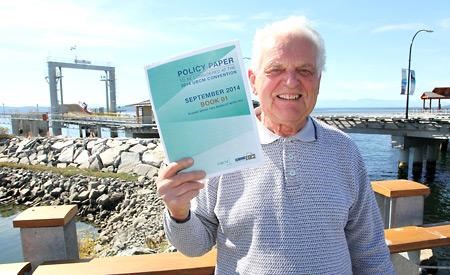Powell River Regional District’s chair will be ramping up concern about BC Ferries’ operation when he meets with the premier next week.
Colin Palmer said a meeting with Premier Christy Clark, Todd Stone, minister of transport and infrastructure, and Shirley Bond, minister of jobs, tourism and skills training, has been scheduled at the Union of BC Municipalities (UBCM) convention in Whistler. Palmer, along with the other coastal regional district chairs, will be highlighting Boatswains to the Bollards, A Socioeconomic Impact Analysis of BC Ferries.
The study, commissioned by UBCM and Association of Vancouver Island and Coastal Communities (AVICC), determined that BC Ferries’ ferry fare increases have resulted in a $2.3-billion reduction in British Columbia’s gross domestic product (GDP) over a 10-year period.
Palmer said he was asked to sit on the special committee that oversaw the study completed by a consultant. The terms of reference were open-ended. After the committee saw the first draft, “we were just so excited about what he had found out,” Palmer said. “We thought, initially, it was going to be one of these ho-hum economic impact studies.”
The consultant said from the outset that he was going to follow the format used by the provincial government for impact studies so the province could not claim results were determined by a different method.
“His first report showed us what was happening in the rest of the province, with taxes, traffic patterns,” Palmer said. “He was opening up this whole new world of information.”
The consultant looked at all forms of transportation in BC and found activity had gone up since the economic crash of 2008. Traffic using BC Ferries, however, dropped by six per cent.
“That statistic alone blew me away,” Palmer said. “The minister, the other day, said it was all due to the meltdown. We can use this document now to refute anything the government comes up with as an excuse.
“When you read this report and you see the amounts of dollars the government has foregone in taxes, and the effects on the economy, no one can convince me this is the equal of the Fast Cats. It’s far worse.”
The damage to the provincial economy from fare increases will be long lasting, Palmer said. As a result of the fare structure, there has been significant diminishment of ridership across the system. Palmer said the total traffic, passengers and vehicles, is now equal to what it was in 1990.
“By having this system, they’ve managed to persuade people not to travel in such a way that they are back to the traffic of 24 years ago,” he said. “That’s another indicator to me that things are seriously wrong.”
The effects of BC Ferries’ policy are tangible in the Powell River region, as documented in the report. Ridership on the Texada Island route has dropped significantly, and Palmer said Powell River’s link to Vancouver Island is “way down.” The Saltery Bay route is a “nightmare” at the moment with the current schedule, averaging up to two hours extra on trips. The Langdale ferry has also been impacted, Palmer said.
The depressing part of this process for Palmer is that he does not know where it is going to end up.
“It’s either going to be some form of cataclysmic collapse, or some slow death,” he said.
“What it tells me is the government financial situation is far worse than anybody knows. Maybe they’ve got to the point where they just don’t know what to do.”
Nicholas Simons, MLA for Powell River – Sunshine Coast, said it is apparent from reading the report that the economic impact of ferries on coastal communities and the overall economy of BC is enormous.
“Every single resident of the Sunshine Coast who has thought about this knew some of these conclusions,” Simons said. “It is nice to have them confirmed, it is nice that we have an outside, neutral agency saying what everyone has been saying from all sides in this community. It just validates what’s been said.
“A government that neglects infrastructure will see its economy falter. Our transportation infrastructure is essential. Ferries are part of that essential transportation.”
Simons sees BC Ferries’ woes as a problem of government underfunding. “The government is not only underfunding but is purposefully and willfully underestimating the importance of BC Ferries for our community.”
In the broader picture, this is a report that speaks directly to economic development and to economic sustainability, Simons said. When the only worry is cost recovery, opportunity to stimulate economic activity and enhance government tax revenues might be foregone. The result of exorbitant fares and service cuts is lost opportunity for economic development, he added.
Simons said the report states quite clearly that as one of the largest marine passenger transportation systems, BC Ferries has an impact on every community in the province.
“That’s why every community in the province should be paying special attention, I think,” he said. “We have been making our case and AVICC has been ably presenting our concerns. What has been missing is the government responding. Todd Stone showed his cards when at first blush he dismissed the report as if he doesn’t believe it. Is he unwilling to do further analysis because he doesn’t want to know the answer?”
Simons said from the report, it is clear that fares have caused ridership to decline.
He thinks the report might have underestimated the effect on the Sunshine Coast and wonders why people living in coastal communities have to suffer disproportionately.
“On the face of it, I think a fair-minded person would say that we are carrying an extra-heavy burden,” he said.
Palmer hopes that citizens will become engaged and that as many people as possible will find copies of this report and read it.
Readers can find the report here.



